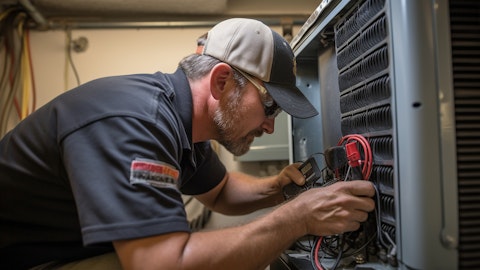And then the last sort of third of the day was pipeline, new opportunities, quick looks at deals we’re looking at, key got to believes or important bets to help them think about both the attractiveness of the potential target and valuation criteria. So that would be our sort of three times a year, more structured, formal gatherings. And then each one of these advisors has encouraged our guys to develop more informal mentor mentee relationships that I’m not involved in. And so there is, I think, a lot of natural back and forth via text and phone call whenever they have something that maybe they don’t want to bring to me but want some advice on that kind of thing. So it’s pretty amazing that they give their time and we have, I think, very impactful gatherings when we all get together.
Adam Patinkin: Got it. That’s great. That’s really helpful color. I appreciate it and I will drop off, but I look forward to seeing you guys in a couple weeks at the AGM.
JT Fitzgerald: Thanks, Adam.
Kent Hansen: Thanks, Adam.
Operator: Your next question is from Douglas Ott with Andvari Associates.
Douglas Ott: Hi, JT and Kent.
JT Fitzgerald: Hi, Doug.
Kent Hansen: Hi, Doug.
Douglas Ott: My first question is regarding the Extended Warranty business. Even though there has been current headwinds, I’d just like for either or both of you to talk about why this is or isn’t a good standalone business over the long-term?
JT Fitzgerald: Yeah. That is a great question. Obviously, when you have companies that — whose product sales are tied to the sale of used vehicles, that you have natural exposure to the economic cycle. In this case, sort of consumer credit cycle, right? And so there is some cyclicality and we’ve been living with that for several quarters, call it, six quarters since the Fed started raising interest rates. Probably even before that with the pandemic and the dislocation in the used car market and all of that. And so start with there is some cyclicality to the business that would be viewed as a negative, right? But the underlying economic fundamentals of these businesses also tick a lot of boxes for us, right? So it is a diversified contractual revenue at high margin and low working capital requirements, negative working capital, right? So these are prepaid contracts.
Douglas Ott: Okay.
JT Fitzgerald: And so the returns on tangible capital are infinite because they require negative capital, right? And so we like the economic characteristics a lot. We don’t love the cyclicality.
Douglas Ott: Right. Right. And perhaps you could also talk about the pros and cons of the Extended Warranty business being paired with a business like KSX?
JT Fitzgerald: Yeah. I mean, I think from the beginning, we have always said that the Warranty business, they’re just like wonderful cash generating businesses. There’s obviously a little bit of volatility in that given the cyclicality, but they see their profits in cash, right? And so we have always viewed them as — and we’ve got wonderful managers running those businesses that are focused on growing them organically and we’ve been able to buy a few over the years at reasonable prices. And in the absence of our ability to redeploy the cash they generate by buying more Warranty businesses, which has been very hard, we have said, well, this is a wonderful source of cash flow that we can allocate to funding our serial acquisition program by leveraging KSX, right? So it is sort of the cash generator for now. And then as KSX scales, it will also be a cash generator to fund ongoing acquisitions as well.
Douglas Ott: Yeah. Well, maybe I can ask a follow-up on that response. All things being equal, whatever that means to you, is there a preference for funding either KSX or the Warranty business or would you like to do both as much as you can give attractive opportunities?
JT Fitzgerald: Yeah. The Warranty businesses require zero capital to scale, right? Because of the capital-like nature of the businesses. And so any capital that we’re required to build more in the Warranty would be via acquisition. And we have just found — these are very attractive businesses and people really like them and so we have found that a good business in the warranty industry is very difficult to buy. Evaluations are much higher than we would be willing to pay. They trade it 15 times, right? And so we’re just not going to be a good buyer of those businesses. And so all things being equal, except valuation, we would rather direct our capital to backing really talented young people looking for businesses with similar attributes in the Search Xcelerator segment.
Douglas Ott: Got it. Got it. Next question for the KSX segment. I’d like you to remind us of a few of the most important things that you guys continue to do today that are going to benefit shareholders over very long-term?
JT Fitzgerald: That’s a great question. Right. So I think it’s a very unique model, Doug. I’ve been involved in Search for a long time. But the idea of matching really wonderful talent to go into a small business that otherwise probably couldn’t attract it, alignment of incentives and then focus on buying the right kind of businesses, right? Large and growing industries where that growth is supported by long-term secular trends. And then within that industry, businesses that have great business models, recurring revenue at high margin and low capital intensity, and then paying very fair multiples for those businesses. And history has proved that we can buy great businesses in growing industries from a founder, a retiring founder for under seven times EBITDA and then take a really talented young entrepreneur and put them in and accelerate growth, right?
And that’s been the model in Search. That’s what we’re doing in Kingsway. And I think Kingsway is like a really exciting platform to do that in, both the long-term nature of our outlook and our ability to hold businesses for a long time and the tax efficiency because of our NOLs.
Douglas Ott: Got it. And one last kind of nitty gritty question. I’m curious from the prior questioner, when it comes to communications with potential OIRs, I’m just curious how much of the communication is outbound versus inbound, and has that changed any at all over time?
JT Fitzgerald: Look, I think it’s both, right? We do outbound just to build awareness, but the best quality is inbound through the networks that continue to get stronger and bigger, right? Each one of our current presidents and OIRs have large networks, Tyler, Will, Tom, et cetera. And so the communication is both directions, I would say. The higher quality communication is inbound.
Douglas Ott: Yeah. Well, I mean, it makes sense that the OIRs that you’ve attracted, they have their own networks and they wind up becoming brand ambassadors, so to speak, right?
JT Fitzgerald: That’s right.
Douglas Ott: Got it. All right. Thank you for your time. I appreciate it.
JT Fitzgerald: Yeah. No. I appreciate the questions. Thanks, Doug.
Operator: There are no further questions from the phone lines. I would now like to turn the floor over to James for email questions.




